
Elul 3, B”H 5783
Table of Contents
The Hebrew month of Elul
You may recall my post from July about Tisha b’Av. In that post, I introduced the Hebrew months of the year to help ubicate us in understanding the significance of certain dates on the Biblical calendar.
One of those months is called “Elul.”
Elul (Heb. אלול) comes from the root word “to search.”
This is the time of year when we are reminded that the LORD searches our hearts and knows us and we repent for those things which we continue to struggle with in our ongoing journey in holiness.
We are to search inside of ourselves and turn away from that which harms our relationship with the LORD Most High as we enter a new Biblical year.

Medieval Jewish sages realized that each letter of the word “Elul” in Hebrew can serve as an acronym for the well-known phrase from Song of Solomon 6:3 “Ani l’dodi, v’dodi li” (Hebrew for “I am my Beloved’s and my Beloved is mine”).

When we reflect on this time of preparation, we see that Elul is a time of preparation for the Bride, for truly the Bridegroom is coming. This is a time of self-examination as we prepare to meet our Coming King. He accepts us with the deepest of love when we come before Him with a pure and contrite heart, made beautiful by our relationship with Him.
Elul, the High Holy Days, and the Coming of the Bridegroom
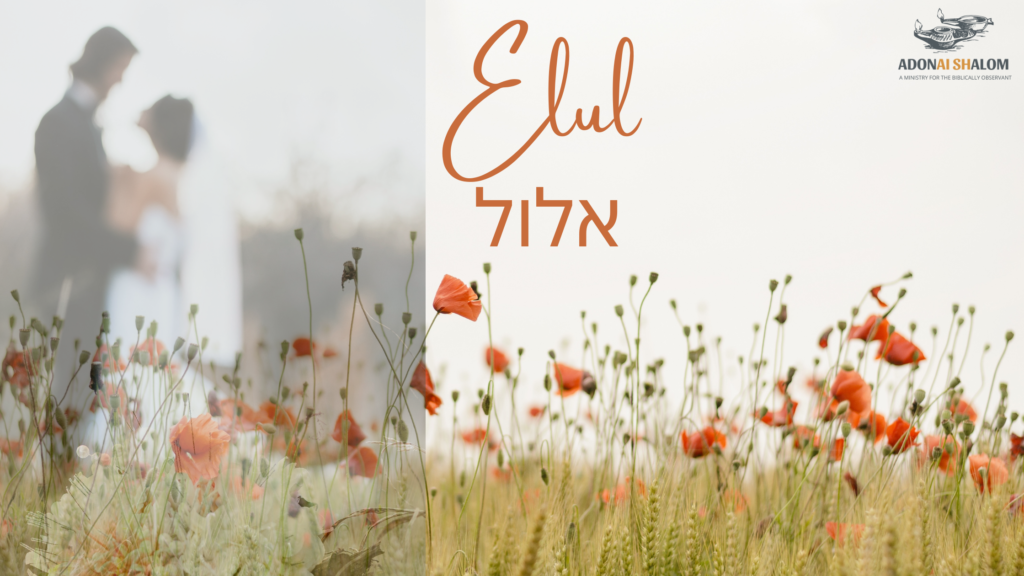
The month of Elul precedes what are known as the High Holy Days. These days include Yom Teruah (also known as Rosh Hashanah) and Yom Kippur. Yom Teruah occurs on the first day of the next month which is known as Tishrei. The High Holy Days are customarily a time of introspection as Yom Kippur serves as the yearly day of atonement. Israel pleads to be written in the Book of Life, and sealed for another year.
Now that our Messiah and Almighty Savior Yeshua (Jesus Christ) has come, those who have confessed Him as LORD and King have the assurance that the names of the saved are written in the Book of Life, never to be blotted out.
Elul is like the month before the wedding. Preparation is made because soon the Bridegroom will come. The Bride may prepare for the Coming Bridegroom with grace, dignity, and confidence because she has been set apart, consecrated, made ready for the moment when her King comes.
Repentance and Holiness
As saved and sanctified children of God, we continue to pursue holiness and the path of righteousness.
Though we may not experience all that which tremendously occurred at Mount Sinai, we now spiritually experience the glory of Mount Zion.
And so terrifying was the sight that Moses said, “I am exceedingly afraid and trembling.”)
See that you do not refuse Him who speaks. For if they did not escape who refused Him who spoke on earth, much more shall we not escape if we turn away from Him who speaks from heaven . . . ” Hebrew 12:18-25, emphases added.
We are to live our lives with quiet and holy fear (reverence).
To do this fully, a true believer and follower of the LORD will very obviously seek to live in humility, all too aware of our faults and failings, but awesomely and intimately aware that He is perfecting us each and every day. We live with an attitude of repentance, thankful that His mercy blots out a multitude of sins. We do the work of ministry, always seeking to share the Word with those who do not yet know Him – not to gain a place in heaven, but to demonstrate our heavenly citizenship! The world glorifies sin. We glorify only Jesus (Yeshua), the One who died to take away our sins and the One who will return for us!

On the Day of Shavu’ot (Pentecost), Peter urged his listeners to repent:
Teshuvah: Biblical Repentance
The Jewish understanding of the concept of “teshuvah” is slightly different than the traditional Christian interpretation of repentance.
Standard Christian repentance is about simply turning away from sin. There is nothing wrong with that. But teshuvah, true Biblical repentance, goes deeper than that.
Teshuvah is a “return.” More specifically, a return to our first love after being astray.
Inherent in teshuvah is the acknowledgement that we have sinned, but this is more about returning to the Way of the LORD than about guilt: it requires an action on our part to strive to right the wrong.
“Teshuvah” is seen as an action. It is often said one is “doing teshuvah.”
Teshuvah means the individual identifies the wrongs they have committed and actively works toward a behavioral change “to right the wrong.” The sinner confesses to God, but also goes back to the one he or she has wronged to ask for forgiveness and attempt to right the wrong.
Christians know that we cannot earn our salvation, so the concept of “teshuvah” gets a bit difficult for many Christians to understand. I have even found that some Christians simply do not want to understand because they would rather remain complacent. Some use texts about grace to shirk any semblance of responsibility, which is a truly irresponsible way to view YHVH’s immense and perfect grace. I believe in grace. I also believe in doing what is right.
Teshuvah is something the Christian can do in gratitude for salvation. Any decent person of faith ought strive to right their wrongs, right? The difference is, we know that we will never be able to erase the evil we have done to another so we cannot completely right our wrongs and we know that. We trust in our Merciful LORD, the Righter of Wrongs to bring healing, restoration, and ultimately wholeness.
Elul is the time of year when teshuvah is emphasized. Hosea uses the term “teshuvah” in admonishing the people of Israel to return to the LORD.
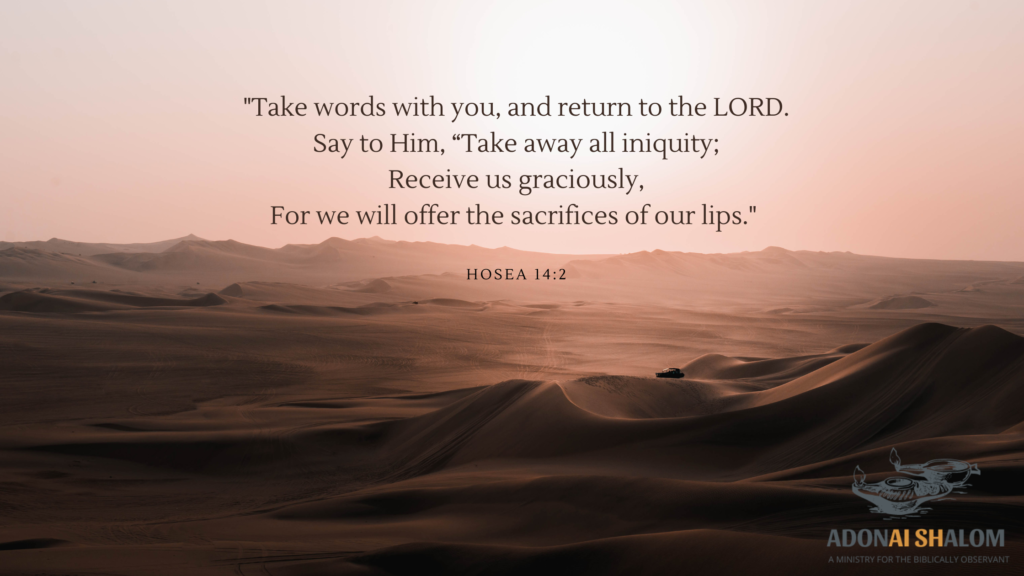
Biblical repentance is about returning to the LORD with nothing hindering our relationship. We are cleansed and made new by the blood of the Lamb and we are victorious by the word of our testimony.
We are ready to meet our Beloved.
“Hatred stirs up strife,
But love covers all sins.” Proverbs 10:12

40 Days of Repentance: Elul or Lent?
The time of repentance observed in the month of Elul is set by Biblical precedent.
It sounds very much like a Hebrew “Lent” for those familiar with Lenten practices.
I will be controversial here, but I’m not one to shy from that . . .
Lent is a manmade invention championed by the liturgical world. It is not Biblical.
Historically, significant efforts were made to distance the “church” from its Jewish (and Biblical, mind you) history. It is no secret that Catholic and Lutheran churches alike were plagued with antiSemitism for many many years.
Those who invented Lent took the concept of Elul (a 40 day time of prayer and fasting lasting from 1 Elul to 10 Tishrei) and “Christianized” it, citing a time to prepare to honor the death and resurrection of Christ. Sadly, the Western inventions of things like Advent and Lent have served to confuse the body of Christ and isolate us from the true Biblical feast days and their significance.
Elul is about returning. Let us return to the basic (Hebraic!) tenets of our faith – to seek to walk on the path of righteousness, guided by the LORD Himself as written in His Holy Word.
From Genesis to Revelation, the Word of God is available to us and if we are not spending time in the Word, that is another reason for repentance.
Collectively, we should repent that the church has strayed so far and has actually contributed to the unbelief of the Jewish people as they observe the glaring discrepancies of many unBiblical “Christian” practices.
May we return to the essence of Elul.
Cheshbon haNefesh: The accounting for the soul
Cheshbon haNefesh is a Hebrew term used frequently throughout the month of Elul. “Cheshbon” is used in modern Hebrew to describe an invoice or bill, such as at a café. Cheshbon: what is owed, what must be paid, the account. Nefesh refers to the soul or what makes you you – it is a word that is also translated as “life” or “being.” Nefesh is the life force within you.
During Elul, we are reminded of His gracious gift. We fall on our knees in the humblest of gratitude, thankful that Yeshua (Jesus) shed His precious blood in payment to redeem our souls.
We owe everything to our Savior yet we know our account has been paid in full.
Elul is a time to reflect on how we are using our nefesh – how are we using the life that is within us to advance the Kingdom of God? It is a time to take ourselves to account.
This is a time to realize where we truly fall short in our relationship with our Creator. In what ways do we fail to love? Do we truly love Him with all our heart, with all our soul, and with all our mind?
HaMelech ba’sadeh: The King is in the field
It is often said during Elul that “the King is in the field.”
The King of all kings, who may seem unapproachable, who is far in His heavenly palace seated on His throne is the same King who reaches out His scepter even when we are unworthy of His mercy. The King of all kings is the same King who comes to our level – He humbled Himself and walked in those fields ripe for harvest.
The Chassidic interpretation is that the King comes when the laborers are in the field – meeting His workers where they are. Surprising them with His presence. Demonstrating kindness.
The King is coming.
The King is in the field.
The King of all kings is approachable and He loves you.
You can go to Him and He will receive you with open arms.
And you will be raptured away in love together.
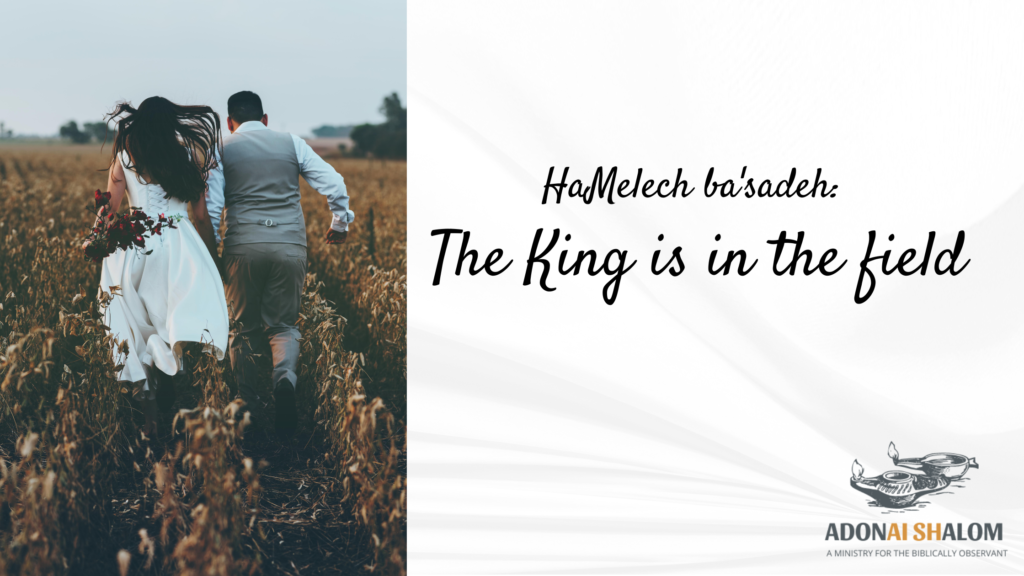
Personal Prayer and Devotional Time during the month of Elul
It is traditional to read Psalm 27 daily during the month of Elul.
One thing I have desired of the LORD,
That will I seek:
That I may dwell in the house of the LORD
All the days of my life,
To behold the beauty of the LORD,
And to inquire in His temple.
For in the time of trouble
He shall hide me in His pavilion;
In the secret place of His tabernacle
He shall hide me;
He shall set me high upon a rock.
And now my head shall be lifted up above my enemies all around me;
Therefore I will offer sacrifices of joy in His tabernacle;
I will sing, yes, I will sing praises to the LORD.

Wait on the LORD;
Be of good courage,
And He shall strengthen your heart;
Wait, I say, on the Lord!
Perhaps you would like to reflect on this passage during this time, as well. This Psalm truly speaks to the relationship aspect of our faith: that we call upon Him and He answers and we are to seek His face.
The King is in the field and the harvest is ready but the workers are few.
Will you meet Him in the field?
Will you share the Good News that the King is coming back again!?
Repent and Rejoice!
Our King is coming for us!
Please comment below! I’d love to hear your thoughts about the month of Elul and the coming of our Almighty King!
![]()



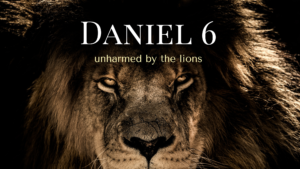

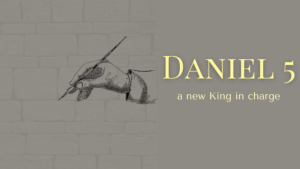

I enjoy studying Hebraic teaching, how great that Elul is like the month before the wedding.
Hi Rebecca: I love that you enjoy studying Hebraic teaching. Yes, there is much to learn about Elul and every year I learn something more which I love sharing with others. Shana tova!